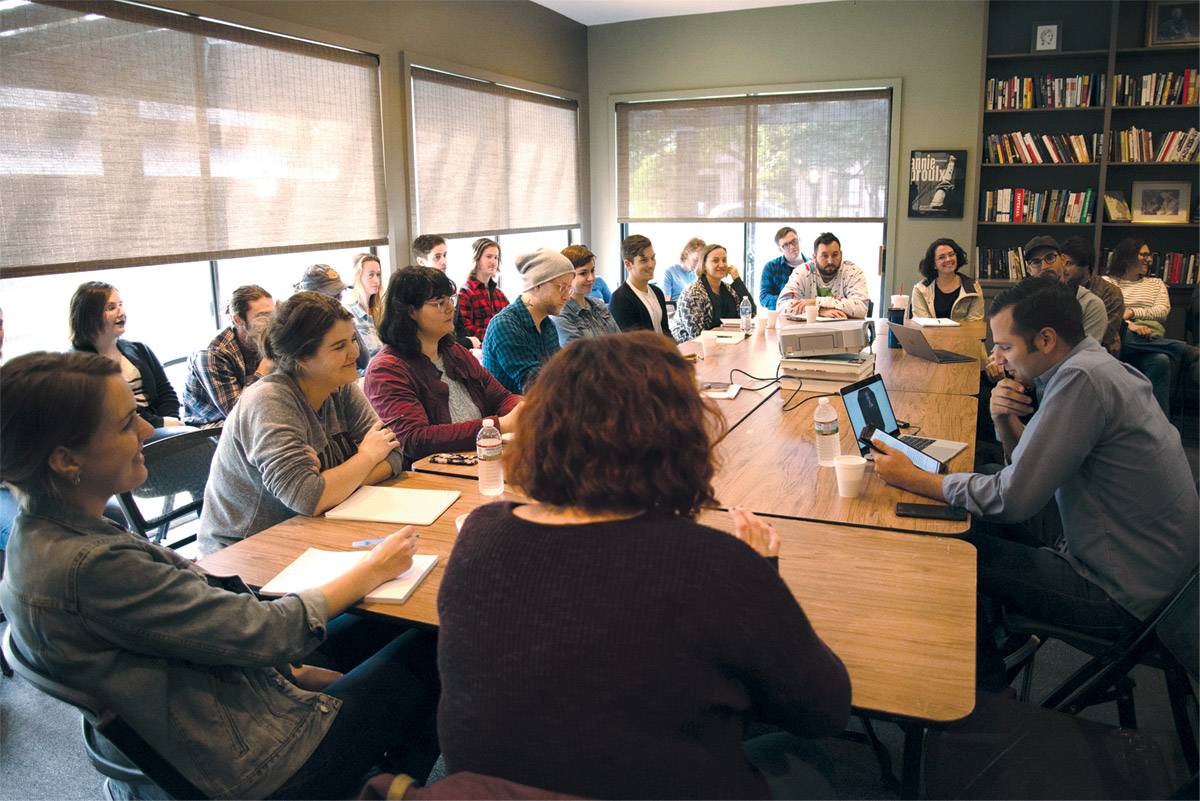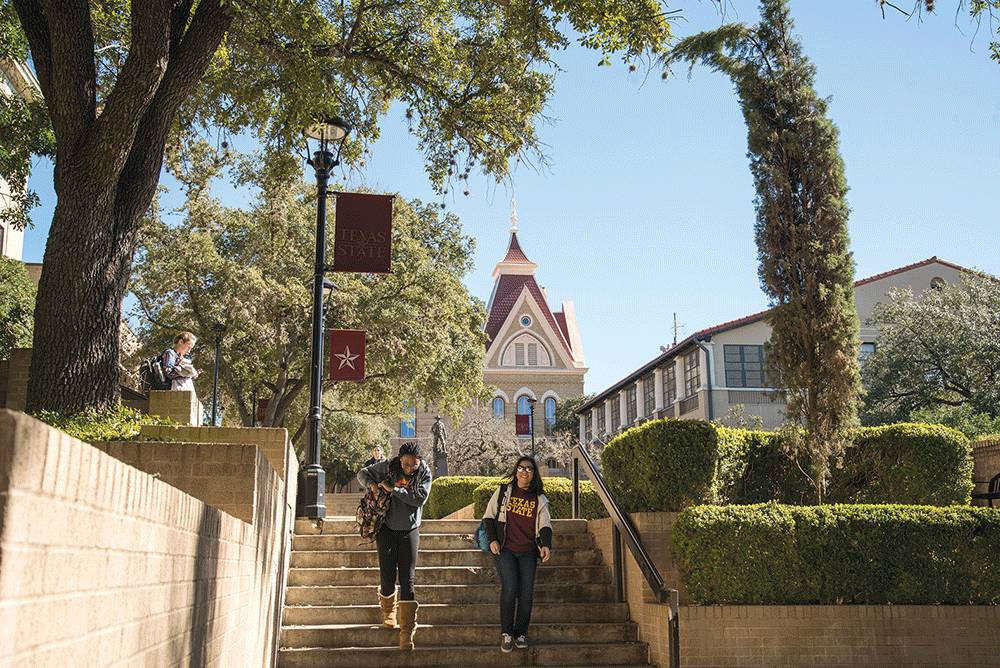The program gives talented authors the opportunity to develop their craft in a formal academic program and a community of writers.
Creative Writing

Program Overview
The M.F.A. program offers students access to incredible resources, including readings and master classes given by acclaimed visiting writers, agent and editor talks, and facilities like the Katherine Anne Porter Literary Center in Kyle and the Clark House in Smithville. Each year, two graduates of the program hold residencies in these literary landmarks.
Course Work
The program requires 48 semester hours, including:
- writing workshops
- literature
- form and theory
- literary techniques
- minor or cognate (other than creative writing)
- thesis credit leading to the production of a book-length work of literary merit
Students may take literature courses in either poetry or fiction, but workshop classes are limited to students who are studying that particular genre. Students may also receive course credit for work on Porter House Review, the program's literary journal.
| Degree | Concentration | Hours | Thesis Option | Minor Option | Location |
|---|---|---|---|---|---|
Degree M.F.A. | Concentration Fiction | Hours 48 | Thesis Option Thesis | Minor Option Minor required | Location San Marcos |
Degree M.F.A. | Concentration Poetry | Hours 48 | Thesis Option Thesis | Minor Option Minor required | Location San Marcos |
Program Details
Recent graduates have won a National Endowment for the Arts Literature Fellowship, a Wallace Stegner Fellowship from Stanford, an AWP prize for Best Novel, and an honorable mention for the PEN/Faulkner Award.
Program Mission
The program provides students with graduate-level knowledge of literature and theory, as well as the skills to function as advanced practitioners within their genre. Students will demonstrate their development as artists through proficiency with the elements of craft in their area of concentration, along with a mature understanding of writerly process and discipline.
Career Options
The M.F.A. is considered a terminal degree, which means that graduates can teach at a university level. Many graduates are working practitioners of fiction, poetry, nonfiction, and screenplays and also possess highly-developed writing skills that are valuable in a wide variety of work environments. Graduates of the Texas State program are competitive with literature doctoral students.
Program Faculty
Our program offers students the opportunity to learn from renowned writers and committed mentors. Students workshop with Tim O'Brien, Naomi Shihab Nye, and our Endowed Chair, a position held on a rotating basis by internationally acclaimed writers, most recently by Kali Fajardo-Anstine, Tea Obreht, and Karen Russell. They also work closely with our full-time faculty, including Doug Dorst, Jennifer duBois, Tom Grimes, and Debra Monroe in fiction, as well as Cyrus Cassells, Cecily Parks, Kathleen Peirce, Roger Jones, and Steve Wilson in poetry.
Contact us for general questions about your application, funding opportunities, and more. If you have specific questions after reviewing the program details, contact the program's graduate advisor.

Already know that Texas State is right for you?
Application Deadlines
-
For Entry Prior to Summer 2026
DEADLINES U.S. CITIZEN INTERNATIONAL Fall January 31 January 31 Spring November 1 October 1 -
Effective for Summer 2026 Entry and Beyond
DEADLINES U.S. CITIZEN INTERNATIONAL Fall - Priority February 1 February 1 Fall - Standard August 1 June 1 Spring - Priority September 1 September 1 Spring - Standard November 1 October 1
For important information regarding deadlines and decision timelines, review the Application Policy Information page.
Admission Requirements
The items required for admission consideration are listed below. Additional information for applicants with international credentials can be found on our international webpages.
-
Application
- completed online application
Review important information about the online application.
-
Application Fee
- $55 nonrefundable application fee, OR
- $90 nonrefundable application fee for applications with international credentials
Review important information about application fees.
-
Transcripts & GPA
- Baccalaureate degree from a regionally accredited university. (Non-U.S. degrees must be equivalent to a four-year U.S. Bachelor’s degree. In most cases, three-year degrees are not considered. Visit our International FAQs for more information.)
- A copy of an official transcript from each institution where course credit was granted.
- A 2.75 overall GPA or 2.75 GPA in your last 60 hours of undergraduate course work (plus any completed graduate courses).
Review important information about transcripts. Official transcripts, sent directly from your institution, will be required if admission is granted.
-
Test Scores
GRE
- GRE not required
Approved English Proficiency Exam Scores
Applicants are required to submit an approved English proficiency exam score that meets the minimum program requirements below unless they have earned a bachelor’s degree or higher from a regionally accredited U.S. institution or the equivalent from a country on our exempt countries list.
- official TOEFL iBT scores required with a 78 overall
- official PTE scores required with a 52 overall
- official IELTS (academic) scores required with a 6.5 overall and minimum individual module scores of 6.0
- official Duolingo scores required with a 110 overall
- official TOEFL Essentials scores required with an 8.5 overall
This program does not offer admission if the scores above are not met.
Review important information about official test scores.
-
Documents
- Statement of purpose (maximum 750 words) discussing your goals for your time in the three-year program:
- How do you hope to use this time to grow as a writer? You might additionally choose to address scholarly goals, professional goals, and/or what you see as the benefits of living and working in a community that embraces individuals from all backgrounds.
- submit as a PDF file
- Three letters of recommendation that address your academic qualifications and your commitment to good citizenship in a collegial and diverse academic community:
- If you are applying for an Instructional or Teaching Assistantship, all letters should also discuss your potential as a teacher
- Creative portfolio (combined into one PDF file):
- Fiction applicants should submit a maximum of 25 double-spaced pages of their work (short stories and/or a novel excerpts)
- Poetry applicants should submit 12-15 poems
- Both Fiction and Poetry applicants may, if they choose, also include one creative nonfiction essay or excerpt in their portfolio, subject to the same 25-page maximum for the manuscript in total
- CV/resume
Review important information about documents.
- Statement of purpose (maximum 750 words) discussing your goals for your time in the three-year program: